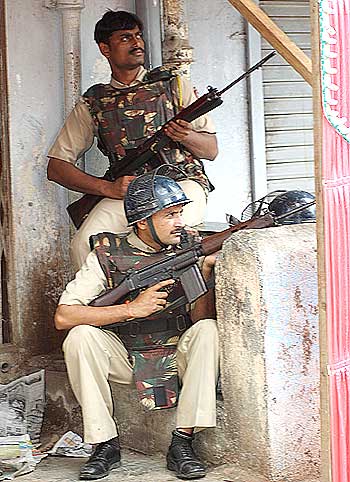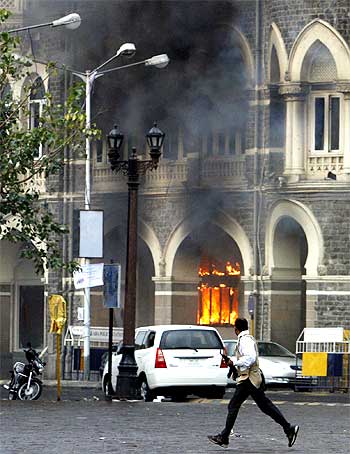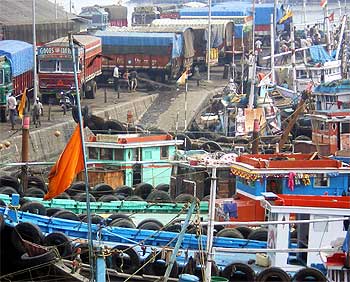
Raman, one of India's leading experts on jihadi terrorism, takes a typically incisive look at last November's terror carnage in Mumbai, which he believes was truly an attack by Pakistan on India, and suggests ways we can prevent a recurrence of such attacks. We are honoured to present excerpts from Mumbai 26/11, A Day Of Infamy, kind courtesy of the publishers.
Point 1: Set up a National Commission of professionals with no political agenda, in consultation with the Leader of the Opposition, to inquire into all the major terrorist strikes that have taken place Indian territory outside Jammu & Kashmir since November, 2007, and task it to submit its report within four months, with no extensions given.
Its charter will be not the investigation of the criminal cases arising from these terrorist strikes, but the investigation of the deficiencies and sins of commission and omission in our counter-terrorism agencies at the Centre and the states, which made these strikes possible.
Point 2: Make the Intelligence Bureau the nodal point for all liaisons with foreign intelligence and security agencies in respect of terrorism, instead of the Research and Analysis Wing. Give the IB direct access to all foreign internal intelligence and security agencies, instead of having to go through the R&AW.
Point 3: Have a common data base on terrorism shared by the IB and the R&AW directly accessible by authorised officers of the two organisations through a secure password.
Point 4: Make the multi-agency centre of the IB function as it was meant to function when it was created -- as a centre for the continuous identification of gaps and deficiencies in the available intelligence and for removing them and for effective follow-up action.
Point 5: Revive the convert action capability of the R&AW and strengthen it. Its charter should make it clear that it will operate only on foreign territory and not on Indian territory. Give it specific, time-bound tasks. All covert actions should be cleared and co-ordinated by the R&AW. Other agencies should not be allowed to indulge in covert actions.
Point 6: The National Security Guards was created as a special intervention force to deal with terrorist situations such as hijacking and hostage-taking. Stop using it for VIP security purposes.
Point 7: Give the police in Delhi, Mumbai, Kolkata, Chennai and Bangalore a special intervention capability to supplement that of the NSG.
Excerpted from Mumbai 26/11: A Day of Infamy, By B Raman, with the kind permission of Lancer Publishers & Distributors.

The training slots offered by the foreign agencies were largely monopolised by the IB and the R&AW. The utilisation of these training slots and the selection of officers for the training should be decided by the National Security Advisor -- with one-third of the slots going to central agencies, one-third to the NSG and one-third to the state police. It is important to build up a core of terrorism and counter-terrorism expertise in all metro towns.
Point 9: The IB's multi-agency centre should have a constantly updated database of all serving and retired officers at the Centre and the states, who had undergone overseas training, and also of all serving and retired officers and non-governmental figures who have expertise in terrorism and counter-terrorism so that their expertise could be tapped, when needed.
Point 10: Strengthen the role of the police stations in counter-terrorism in all major cities. Make it clear to all Station House Officers that their record in preventing acts of terrorism, in contributing to the investigation and prosecution of terrorism-related cases and in consequence management after a terrorist strike will be an important factor in assessing their suitability for further promotion.
Revive and strengthen the beat system, revive and intensify the local informants for suspicious activities in all railway stations, bus termini, airports, hotels, inns and other places and improve police-community relations.

Point 12: Stop using the National Security Council Secretariat as a dumping ground for retired officers, who are favoured by the government. The NSCS cannot be effective in its role of national security management if it is not looked upon with respect by the serving officers.
The serving officers look upon the retired officers of the NSCS as living in the past and in a make-believe world of their own, totally cut off from the ground realties of today in national security management. The NSCS should be manned only by serving officers of acknowledged capability for thinking and action.
Point 13: Strengthen the role of the National Security Advisory Board as a government-sponsored think tank of non-governmental experts in security matters to assist the NSCS and the NSA. Give it specific terms of reference instead of letting it freelance as it often does. It should be discouraged from undertaking esoteric studies.
Point 14: Set up a separate Joint Intelligence Committee to deal with internal security assessment of intelligence having a bearing on internal security requires different expertise and different analytical tools than assessment of intelligence having a bearing on external security. In 1983, Indira Gandhi, then prime minister, bifurcated the JIC and created a separate JIC for internal security. Rajiv Gandhi reversed her decision. Her decision was wise and needs to be revived.

Its tasks should be to monitor intelligence collection by various agencies, avoid duplication of efforts and resources, integrate the intelligence flowing from different agencies and foreign agencies, analyse and assess the integrated intelligence and monitor follow-up action by the police, the Federal Bureau of Investigation and other concerned agencies.
Every agency is equally and jointly involved and responsible for the entire counter-terrorism process starting from collection to action on the intelligence collected. If such a system had existed, post-Mumbai complaints such as those of the IB and R&AW that the advisories issued by them on the possibility of a sea-borne attack by the Lashkar-e-Tayiba on Mumbai were not acted upon by the Mumbai police and the navy would not have arisen because the IB an the R&AW would have been as responsible for follow-up action as the Mumbai police and the navy.
Point 16: The practice of the privileged direct access to the prime minister by the chiefs of the IB and the R&AW, which came into force under Jawaharlal Nehru and Indira Gandhi, should be vigorously enforced. This privileged direct access is utilised by the intelligence chiefs to bring their concerns over national security and over inaction by the agencies responsible for follow-up on their reports to the personal notice of the prime minister and seek his intervention.

This is the only way of getting round the present political deadlock over the revival of the Prevention of Terrorism Act.
Point 18: Expedite the erection of the border fence with Bangladesh without worrying about opposition from Bangladesh.
Point 19: Start a crash program for the identification of illegal immigrants from Bangladesh and for deporting them. Ban the employment of immigrants from Bangladesh anywhere in Indian territory.
Point 20: Strict immigration control is an important part of counter-terrorism. The post-9/11 safety of the US is partly due to the tightening up of immigration procedures and their strict enforcement. Among the best practices adopted by the US and emulated by others are: Photographing and finger-printing of all foreigners on arrival, closer questioning of Pakistanis and persons of Pakistani origin, etc.
We have not yet adopted any of these practices. Hotels and other places of residence should be banned from giving rooms to persons without a departure card and without a valid immigration stamp in their passports. They should be required to take photocopies of the first page and the page containing the immigration stamp of the passports of all foreigners and also the departure card stapled to the passport and send them to their local police station every morning.
All immigration relaxations introduced in the case of Pakistani and Bangladeshi national and persons of Pakistani and Bangladeshi origin should be cancelled with immediate effect. The requirement of police reporting by them should be rigorously enforced.
It should be made obligatory for all persons hosting Pakistanis and Bangladeshis to report to the local police about their guests. A vigorous drive should be undertaken for tracing all Pakistanis and Bangladeshis overstaying in India after the expiry of their visas and for expelling them.
Point 21: The MEA's capability for terrorism-related diplomacy should be strengthened by creating a separate division for this purpose. It should continuously brief all foreign governments about the role of Pakistan and Bangladesh in supporting terrorism in Indian territory and press for action against them.
Point 22: The Mumbai strikes have revealed serious gaps in our maritime security on our western coast. This is partly the result of our over-focus on the Look East policy and the neglect of the Look West dimension. This was corrected in the beginning of 2008. Despite this, there are apparently major gaps as seen from an alleged failure by the naval and Coast Guard authorities to act on the reports of the IB and the R&AW about likely sea-borne threats from the LeT.
The identification and removal of the gaps need immediate attention. The Mumbai off-shore oil installations and the nuclear and space establishments on the western coast are also vulnerable to sea-borne terrorist strikes.
Excerpted from Mumbai 26/11: A Day of Infamy, By B Raman, with the kind permission of Lancer Publishers & Distributors.